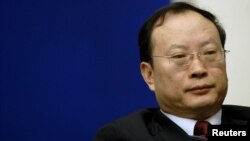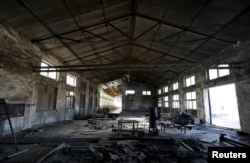For years, world governments and multinational companies have fretted over the quality of China’s economic statistics. The recent launching of a Communist Party investigation into Wang Baoan, head of the National Statistical Bureau, on suspicions of corruption, has heightened those concerns.
As the world’s second largest economy, which has enormous sway on global markets, Chinese statistics are of great importance. Economists are now asking what prompted the government to launch the investigation only months after Wang had been vetted for this crucial job.
So far, it is not entirely clear why Wang has been targeted.
"I do not have any information or insights about the allegations of misdoings in the Statistical Bureau,” said Penelope Prime, director of the Atlanta based China Research Center. “I understand there is pressure to report as positive numbers as possible in terms of growth, but everyone knows that the economy is slowing".
Some analysts have suggested that the investigations could be related to his work before being appointed to the NSB. Whatever the reasons, the move is likely to affect the international confidence in Chinese statistics.
“To remove the head of the statistics department for violations of party discipline just gives ammunition to those that doubt Chinese government statistics, and so the negative is clear,” said Jonathan Brookfield, professor in The Fletcher School of Law and Diplomacy at the U.S. based Tufts University.
It is possible the government is trying to replace Wang with someone it can trust more. “Having one's own person there, I think, could be helpful in a number of ways,” Brookfield said while listing the benefits the government can derive from it.
“The net effect might be to downplay something unpleasant like a slowdown in economic growth,” he said.
The NBS can bring about this effect even without the need to cover up existing data. It can also change the way certain items are measured, and control the timing of data release, and he pointed out.
Real GDP?
International research organizations have long questioned China’s GDP figures, saying they are deflated during years of boom, and inflated when there is a marked slowdown as is happening now. Some economists say China’s economic growth may be one or two percent lower than the 6.9 percent claimed by the government.
Agatha Kratz, an associate research fellow at the London based European Council on Foreign Relations, feels that China’s GDP statistics cannot be fully relied on because the government does not explain how it uses the GDP deflator, a yardstick used to adjust the value of goods and services to current prices.
“Real GDP figures are often believed to be somewhat less reliable. This is due to strong opacity around the calculation of the GDP deflator, which allows real GDP smoothening for political reasons,” she said.
But attempts to rework statistics do not help China because world economists are already factoring in a strong margin of error while analyzing Chinese numbers.
“The real GDP, while probably smoothened, cannot hide more profound underlying trends –notably that of a clearly decelerating growth trajectory in China, which everyone has become aware of,” Kratz said.
'Wind of falsification'
Even the Chinese government makes little effort to downplay the fact that the official data is not fully accurate.
Chinese state media reports recently noted that several officials in northeastern China admitted to inflating investment figures and other data in previous years.
In fact, Chinese officials have been struggling for two decades to overcome the “wind of falsification and embellishment” in data collection and reporting.
In 1999, then NBS director, Zhang Sai complained about "administrative interference in statistical work."
A year later, then Premier Zhu Rongji admitted that "falsification and exaggeration are rampant."
At one stage, the state-backed China Daily warned "statistical fraud will affect the country's economy by jeopardizing economic planning and policy-making."
Shanghai Surprise
Shanghai City Mayor Yang Xiong sprung a surprise in January last year when he declared the city was dispensing with the practice of fixing gross domestic product growth targets. Instead, he said the city would focus on sustainable and innovation driven growth and not chase investment and growth numbers.
Ironically, Shanghai made the decision to change course after its growth lagged behind national development figures.
One reason why officials over-report growth and results for other official targets is that their promotions are tied to their ability to meet those goals.
When it comes to exports and imports, a widely used practice is to over-invoice or under-invoice.
"High invoicing of exports does seem to be common and growing. I believe this is related to the demand for taking money out of the country beyond what is allowed, which is $50,000 per person per year," said Prime of the China Research Center.






